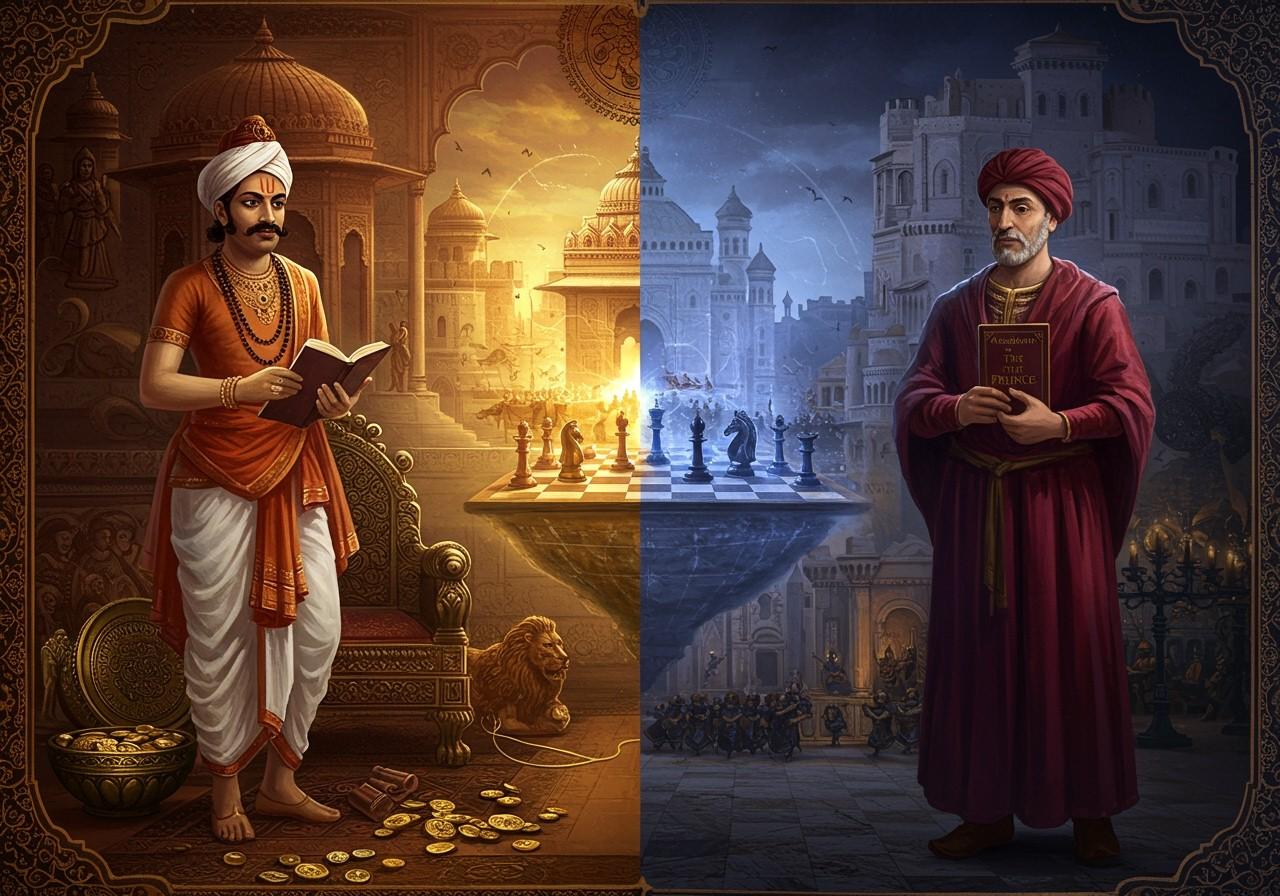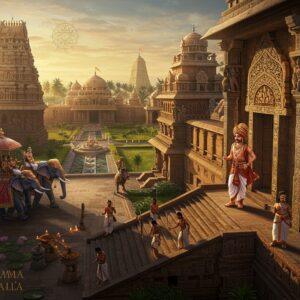
Kautilya, also known as Chanakya, and Niccolò Machiavelli are two of history’s most influential political thinkers. Though separated by centuries and geography, their works, the Arthashastra and The Prince, respectively, draw comparisons for their pragmatic approaches to statecraft. This article delves into their political philosophies, examining their common ground and differences, and exploring why Kautilya is often called the “Indian Machiavelli.”
Kautilya: The Architect of Indian Statecraft
Kautilya, also known as Chanakya or Vishnugupta, was an ancient Indian scholar and advisor to Chandragupta, the first Mauryan emperor. His masterpiece, the Arthashastra, is a comprehensive treatise on statecraft, economic policy, and military strategy.
Key Themes of the Arthashastra
- Realpolitik: This emphasizes practical and pragmatic governance, focusing on achieving tangible results rather than adhering to idealistic principles. Kautilya believed that a ruler should prioritize the welfare of the state above all else, even if it meant making difficult or unpopular decisions.
- Welfare of the State: The Arthashastra stresses the importance of a prosperous and stable state. Kautilya outlines policies for economic growth, efficient administration, and social order, all aimed at strengthening the kingdom.
- Strong Central Authority: Kautilya advocated for a powerful central government with a capable ruler at its helm. He believed that a strong ruler was essential for maintaining order, defending the kingdom, and promoting prosperity.
- Strategic Alliances and Espionage: Recognizing the importance of diplomacy and intelligence, Kautilya emphasized forming strategic alliances and employing espionage to gain an advantage over rivals and maintain national security.
Kautilya’s vision of leadership included a strong central authority and the strategic use of alliances and espionage for stability.
Machiavelli: The Father of Modern Political Philosophy
Niccolò Machiavelli, a Renaissance-era Italian diplomat, philosopher, and writer, is best known for The Prince, a guide for new rulers on acquiring and maintaining power.
Main Themes of The Prince
- Cunning and Ruthlessness: Machiavelli advised rulers to employ cunning strategies and, when necessary, ruthless tactics to achieve their political objectives. He believed that in the pursuit of power, morality should sometimes take a backseat to practicality.
- Pragmatism in Governance: Like Kautilya, Machiavelli emphasized practical measures over moral considerations. He believed that a ruler should focus on what works best for the state, even if it means bending ethical rules.
- Virtù and Fortuna: Machiavelli explored the interplay of skill (virtù) and luck (fortuna) in leadership. He argued that while fortune plays a role, a skilled ruler can shape their destiny through foresight, adaptability, and decisive action.
Machiavelli’s concept of virtù involves adapting to changing circumstances, while fortuna represents the role of luck.
Kautilya vs. Machiavelli: A Comparative Analysis
While both philosophers championed a pragmatic approach to politics, their philosophies differ in key areas.
Key Differences
- Morality in Governance: Kautilya, while pragmatic, emphasized dharma (duty and righteousness) in governance. This contrasts with Machiavelli’s more secular recommendations, where morality is secondary to political expediency.
- Use of Force: Kautilya advocated for a balance of power and the judicious use of force. Machiavelli, while not promoting wanton violence, was more accepting of fear and manipulation as tools of control.
Poojn.in Enhances Your Exploration of Ancient Political Thought
At Poojn.in, we recognize the profound link between spiritual wisdom and political philosophy within Indian tradition. For those studying Kautilya’s Arthashastra and comparing it with Machiavelli’s works, we offer items to enrich your learning experience:
- Complete Arthashastra Text Sets: Dive deep into the original text with our Sanskrit editions, accompanied by English translations for enhanced understanding. Explore our collection.
- Traditional Brass Study Lamps: Enhance your focus during studies with these beautifully crafted lamps, evoking a sense of tradition and reverence for ancient knowledge. Find your perfect lamp here.
- Pure Copper Water Vessels: Embrace the Vedic tradition of storing water in copper vessels, believed to enhance its purity and health benefits. Browse our copper vessel collection.
- Incense Sticks: Create a serene and conducive atmosphere for contemplation with our authentic incense sticks. Discover our range of incense.
Visit www.poojn.in to discover these and other traditional items that complement your exploration of ancient wisdom. We ensure authenticity and quality, providing you with the tools for in-depth study and reflection on these essential political texts. All products are available for nationwide delivery with secure packaging.
Conclusion: Linking Ancient Wisdom with Modern Governance
Kautilya and Machiavelli, despite their distinct contexts, provide enduring insights into governance. Both the Arthashastra and The Prince highlight the importance of pragmatic and strategic leadership. While Kautilya integrates moral duty with political strategy, Machiavelli prioritizes power and control.
Studying these philosophies enhances our understanding of political thought across civilizations. Comparing Kautilya and Machiavelli offers a richer perspective on leadership and governance, with lessons relevant for modern leaders and policymakers. By embracing the wisdom of these thinkers, we can strive for a balanced and effective governance system, respecting tradition while adapting to contemporary needs.
FAQs on Kautilya and Machiavelli
What are the core tenets of Kautilya and Machiavelli’s philosophies? Kautilya’s core tenets revolve around statecraft, economic policy, and military strategy, as detailed in his Arthashastra (circa 3rd century BCE). Machiavelli’s ideas, primarily presented in The Prince (1532), center on political power, leadership, and the strategic use of cunning and, at times, deceit.
Why is Kautilya often referred to as the “Indian Machiavelli”? Both thinkers offered practical advice on acquiring and maintaining power, often suggesting ruthless tactics when deemed necessary. Their works are considered groundbreaking in political strategy, leading to the comparison.
How do their ethical perspectives differ? Kautilya’s ethics, rooted in dharma, are more nuanced, allowing for actions that might be considered morally ambiguous if they ultimately benefit the state. Machiavelli also accepts the use of unethical means but stresses the importance of a ruler appearing virtuous to maintain public support.
What is the significance of the Arthashastra? The Arthashastra is a significant text because it provides a comprehensive guide to governance, economics, and military strategy. It has profoundly influenced Indian political thought and practice for centuries.
How did The Prince shape modern political thought? The Prince introduced the concept that the ends can justify the means, emphasizing realpolitik. This significantly altered how leaders viewed power and governance.
Do their leadership recommendations share any similarities? Yes, both Kautilya and Machiavelli advise leaders to be pragmatic, strategic, and decisive, even if it requires ruthlessness. They both emphasize the importance of maintaining power and control for the stability and prosperity of the state.
Did they advocate for specific forms of government? Kautilya focused on monarchy and the administration of a kingdom. Machiavelli’s advice in The Prince is more general, aimed at helping individual rulers maintain power regardless of the specific governmental structure.
What are their views on deception in politics? Both saw deception as a necessary tool in politics. Kautilya recommended using spies and cunning tactics, while Machiavelli suggested that a ruler should be adept at deception to maintain control and achieve political goals.


